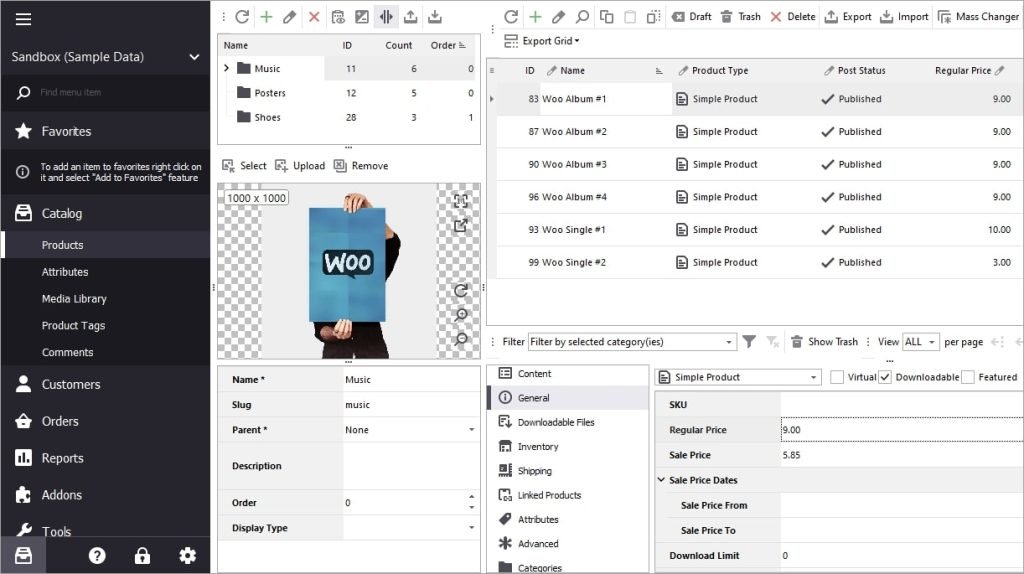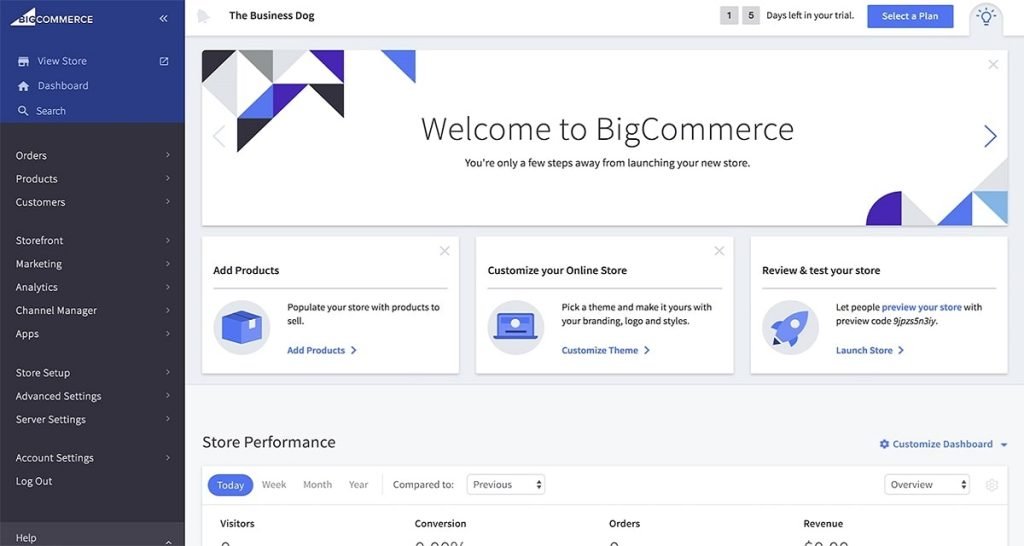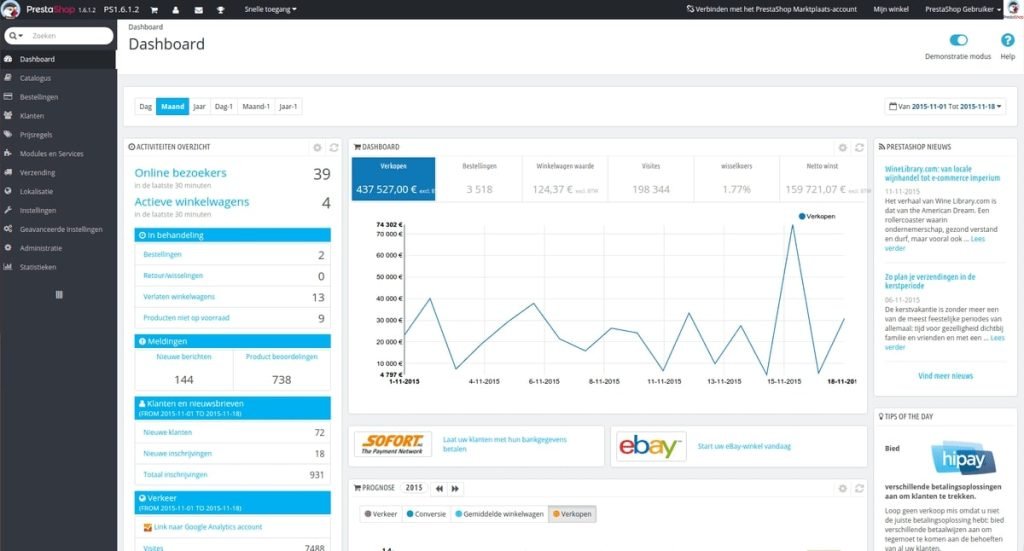Table of Contents
In the digital ocean of e-commerce, choosing the right platform is the compass that will guide your business journey to success. In a world where online has become the new meeting space between consumers and businesses, the decision on the platform becomes a crucial element that goes beyond the technological aspect.
Enjoy:
- Over 60 AI tools to create quality content
- More time for creativity, stress-free
- Impactful content that attracts readers and visitors
All with just one click.
This article aims to explore the vast universe of e-commerce platforms, analyzing the various options available and guiding in understanding the key factors to consider. From the nature of the product or service to customization needs, we’ll address every aspect to help you make an informed and success-oriented decision. Get ready for a journey through the waters of platform choice, where awareness of the unique needs of your business is your compass.
Crucial Factors in Choosing E-commerce Platforms
As mentioned, the choice of e-commerce platforms is of paramount importance, as it acts as the ‘beating heart’ of the online store.
The decision between e-commerce platforms should be based on the specific needs of the business. For example, it’s essential to consider
- scalability, meaning the platform’s ability to grow and expand at the pace of the business. A scalable platform allows the online store to handle an increase in traffic and sales seamlessly.
- the ease of use of the platform. It’s crucial that it is intuitive and allows even those without advanced technical skills to effectively manage their online store.
- order management: the platform should provide tools to handle the entire order and payment process, allowing easy communication with customers and inventory management.
- Integration with Other Tools and Business Systems. For instance, it might be necessary to integrate the online store with an inventory management system or an accounting system. Choosing a platform that offers this integration streamlines the workflow and management of business operations.
Finally, e-commerce platforms provide a solid foundation for managing the online store and facilitate adaptation to the changing market needs. This means that the platform should be flexible and updated with new trends and technologies. Additionally, reliable technical support and customer assistance are crucial to address any issues or queries that may arise during the platform’s use.
Choose Wisely: The Top 5 Platforms for Your E-commerce
In the vast landscape of e-commerce platforms, the decision on the best options plays a crucial role in determining the fate of your online store.
Let’s explore together the ‘Top 5’ in an analysis that will provide you with a clear vision to make informed decisions. This brief journey through the distinctive features of each platform will give you the key to shaping a successful digital store, not only aligned with your needs but ready to challenge the expectations of the e-commerce market.
Shopify

Shopify is a leading e-commerce platform, founded in 2006 and headquartered in Ottawa, Canada. It provides a comprehensive solution for launching, managing, and growing online businesses. It allows for easy creation of an online store, management of payment transactions with various methods, and features such as integrated blogging. With over 10,000 employees, Shopify is known for its quick and simple setup, suitable for a wide range of users, including web agencies, copywriters, and content creators.
Shopify offers several advantages:
- Ease of Use: Shopify is known for its intuitive and user-friendly interface. The platform is designed to allow even those without in-depth technical knowledge to easily create and manage their online store.
- Quick Setup: Thanks to predefined templates and customization tools, it’s possible to set up an online store quickly without dealing with complex development processes.
- Security and Reliability: Shopify is committed to ensuring the security of customer data and online transactions. It offers cloud hosting, secure checkout, and supports industry-standard security protocols.
- Wide Range of Features: The platform provides a complete set of features, including inventory management tools, sales analytics, integrated marketing tools, and a straightforward payment system.
- Mobile-Friendly: Shopify is optimized for mobile devices, ensuring that online stores are accessible and functional on any device, enhancing the user experience.
- Support and Assistance: Shopify provides efficient customer service and a wide range of resources, including online guides, forums, and 24/7 support to address any issues or answer questions.
- Applications and Integrations: The platform offers an app store with numerous apps and integrations, allowing users to further customize their online store by adding specific functionalities.
- Automatic Updates: Shopify automatically manages updates and security patches, ensuring that the store is always aligned with the latest security standards.
- Easy Scaling: Suitable for both small and larger businesses, Shopify allows for easy scaling of the online store as the business grows.
In summary, Shopify is a complete and flexible solution that offers numerous advantages for anyone looking to efficiently start and manage an online store.
Shopify offers various paid plans, each with specific features to cater to the diverse needs of users:
- Basic Plan: This is the most economical plan, ideal for beginners. It includes all the essential features to create and manage an online store. However, it may have higher transaction fees.
- Shopify Plan: This plan offers advanced features compared to the basic plan, with lower transaction fees. It also includes more detailed reporting tools and advanced discount options.
- Advanced Plan: This is the advanced Shopify plan, designed for larger businesses with more complex needs. It offers advanced reporting and analytics features, as well as lower transaction fees.
- Shopify Plus: This is the enterprise-level plan, suitable for very large businesses. It offers customized features, dedicated support, and tailored solutions for the specific needs of the company.
The costs of the plans vary based on the user’s specific needs and transaction volume. Shopify also offers a free trial to allow users to test the platform before committing to a paid plan. It is advisable to carefully review the available options and select the plan that best fits your needs and budget.
WooCommerce

WooCommerce is an open-source eCommerce platform designed to function as a WordPress plugin. This tool offers a flexible and accessible solution for creating e-commerce sites. The platform enables users to create customized online stores, manage payments, and offer a wide range of products. It is designed to seamlessly integrate with popular WordPress themes, ensuring unrestricted customization to stand out from the competition. From layout to the checkout button, WooCommerce provides complete control over the site’s appearance.
The advantages of WooCommerce include:
- Integration with WordPress: As a WordPress plugin, WooCommerce seamlessly integrates with the world’s most popular CMS, providing users with the familiarity of the WordPress environment and facilitating the management of the online store.
- Flexibility and Customization: WooCommerce offers a high degree of flexibility, allowing users to customize every aspect of their online store.
- Large Community and Support: Being part of WordPress, WooCommerce benefits from a vast community of developers and users.
- Free and Open Source: The foundation of WooCommerce is free and open source, making access to the eCommerce world more accessible. This means users can start without significant initial costs.
- Simplified Management: WooCommerce offers intuitive tools for managing products, inventory, orders, and payments. Its user-friendly interface facilitates the day-to-day management of e-commerce activities.
- Wide Payment Options: It supports various payment options, allowing users to offer customers a variety of payment methods, including credit cards, PayPal, bank transfer, and more.
- Scalability: Suitable for both small stores and larger businesses, WooCommerce is designed to grow with the business.
- Analytics and Reporting: It provides integrated analytics tools that allow users to monitor store performance, track sales, and gain valuable insights for informed decision-making.
WooCommerce offers a free and open-source foundation, but there are also paid options for those who want access to advanced features or additional services. Below are some of the paid plans associated with WooCommerce:
- Premium Extensions: WooCommerce provides a marketplace of premium extensions that add advanced features to your online store. These extensions may include additional payment options, advanced marketing tools, integrations with shipping services, and more.
- WooCommerce Hosting: While the WooCommerce plugin is free, the cost of hosting your online store is an important consideration. Some hosting providers offer plans specifically optimized for WooCommerce, ensuring high performance and simplified management.
- Support and Assistance Services: Premium support services may be available, such as dedicated assistance, consultation on advanced configurations, or resolution of specific issues. These services may be offered directly by WooCommerce or third-party providers.
- Subscriptions to Additional Services: Depending on the specific needs of your store, you may need to subscribe to additional services, such as advanced security services, automatic backups, or advanced analytics tools.
It is important to carefully examine your business needs and assess whether the investment in paid plans or additional services is justified.
Magento

Magento is a powerful open-source e-commerce platform launched on March 31, 2008. Created by Varien and built on the Zend Framework, Magento offers a robust and flexible CMS for content management within websites, primarily dedicated to online commerce. Its main appeal lies in the complete freedom offered by the open-source version.
Magento is known for its flexibility and scalability. It allows managing various brands across different channels and markets, offering complete control over B2C and B2B sites and marketplaces from a single interface. The platform supports a wide range of features and is widely used to create high-quality e-commerce sites.
The operation of Magento is based on a hosting system that can vary significantly in cost, depending on the needs. The platform is designed to provide advanced management of content and online transactions.
The costs of creating a site with Magento can vary significantly. It is important to consider the specific project needs, the complexity of the design, required functionalities, and the level of customization.
The advantages of Magento are:
- Flexibility and Scalability: Magento is extremely flexible and scalable, suitable for both small online stores and large and complex e-commerce sites. Its modular architecture allows for advanced customization.
- Wide Range of Features: The platform offers a wide range of features, including advanced tools for product management, orders, payments, and shipping. This allows users to create rich and engaging online shopping experiences.
- Active Community: Magento has an active global community of developers, users, and industry professionals. This translates into extensive support, rich documentation, and a constant flow of extensions and plugins available.
- SEO-Friendly: The platform is designed with SEO best practices in mind, offering features and tools that facilitate site optimization for search engines. This contributes to better online visibility.
- Multi-Store Management: Magento allows centralized management of multiple online stores through a single administrative interface. This feature is particularly useful for companies with various product lines or brands.
- Advanced Security: The platform is committed to the security of sensitive customer data and offers advanced features to protect the site from online threats, including industry-standard security standards.
- Wide Choice of Themes and Templates: Users can choose from a wide range of themes and templates to customize the appearance of their online store. This allows creating a unique design and adapting it to the specific needs of the brand.
Magento also offers paid plans, in addition to its open-source version. The paid version is known as Magento Commerce.
Here is some information about the paid plans:
- Magento Commerce:
- Magento Commerce is the paid version of the platform.
- It offers advanced features and additional services compared to the open-source version.
- It is designed to meet the needs of medium to large-sized businesses.
- Cost Structure:
- The costs of Magento Commerce can vary based on various factors, including sales volume, required features, and the level of support needed.
- Specific details about costs are often provided directly by Magento or its partners.
- Customized Plans:
- Since Magento Commerce is often used by large companies with specific needs, plans can be customized to fit individual situations.
Before choosing among the available options, it is advisable to assess the specific needs of your project, the available budget, and the required features.
BigCommerce

BigCommerce is a NASDAQ-listed e-commerce platform that provides software-as-a-service (SaaS) to retailers. Founded in 2009 in Sydney, Australia, it offers a comprehensive range of services, including online store creation, search engine optimization, hosting, marketing, and security. The platform is used by both small and large businesses.
Providing enterprise-level e-commerce solutions, BigCommerce stands out for its user-friendliness, competitive pricing, and advanced features.
BigCommerce offers several advantages contributing to its popularity as an e-commerce platform:
- Ease of Use: The platform is designed to be user-friendly, allowing users to easily create and manage their online store without requiring advanced technical skills.
- Search Engine Optimization (SEO): BigCommerce provides built-in tools to optimize online stores for search engines, improving online visibility and attracting more organic traffic.
- Flexibility and Scalability: Suitable for both small businesses and large enterprises, BigCommerce offers flexible and scalable solutions that adapt to the evolving needs of the business.
- Security: The platform places a strong emphasis on security, implementing measures to protect customer data and ensure secure transactions.
- Wide Range of Integrations: BigCommerce offers a rich ecosystem of apps and integrations with third-party services, allowing users to further customize the functionality of their store.
- Customer Support: The platform provides 24/7 customer support, ensuring timely assistance and efficient issue resolution.
- Competitive Pricing: With competitive pricing plans, BigCommerce offers excellent value for money compared to other e-commerce platforms, especially considering the features provided.
In fact, BigCommerce offers several paid plans for its users:
- Standard: Ideal for small businesses or those just starting with e-commerce. Includes essential features such as unlimited products, support for multiple sales channels, SSL security, and search engine optimization (SEO) tools.
- Plus: Designed for growing businesses. In addition to the features of the Standard plan, it offers additional tools such as customer reviews, abandoned carts, and advanced reports for performance monitoring.
- Pro: Targeted at medium-sized businesses, it offers advanced features like advanced customer analytics, custom filters, and advanced promotions.
- Enterprise: Designed for large enterprises with complex needs. Offers customizable features, dedicated support, and a wide range of tools to manage large-scale e-commerce operations.
PrestaShop

PrestaShop is an open-source CMS specialized in creating e-commerce websites. Launched in 2007, PrestaShop distinguishes itself from more generic CMS as it is entirely designed for the development and management of e-commerce activities. With programming languages like PHP and JavaScript, it is a versatile and adaptable platform.
PrestaShop offers several advantages that make it a popular choice for creating online stores:
- Open Source and Free: PrestaShop is an open-source CMS, making the start of an online store accessible to a wide range of users.
- Wide Variety of Modules and Themes: PrestaShop’s official marketplace offers a wide range of modules and themes that allow users to customize and add features to their online store based on the specific needs of their industry.
- Adaptability and Flexibility: PrestaShop is designed to be flexible and adaptable to various business needs. You can customize the design, appearance, and functionality of the store to fit specific sales strategies.
- Active Community: PrestaShop has an active global community of developers, users, and industry professionals who provide resources, solutions, and technical support.
- Intuitive Management: PrestaShop’s management interface is designed to be intuitive and user-friendly. This allows users to manage their online store without the need for advanced technical skills.
- Regular Updates: PrestaShop undergoes regular updates that include performance improvements, new features, and bug fixes. This helps ensure that the platform stays up-to-date and secure over time.
- Scalability: PrestaShop can handle online stores of various sizes. This means it can be used for small shops as well as large e-commerce businesses with a significant number of products.
Choosing PrestaShop can be advantageous for those looking for a flexible, customizable, and reliable solution for creating and managing online stores.
PrestaShop offers paid plans that provide additional features and premium services for users who want a higher level of support and customization. Some of the paid options include:
- Classic Offer: PrestaShop offers a Classic offer that provides advanced features for creating and managing an online store. This plan may include services such as hosting, dedicated technical support, and access to premium modules.
- Premium Modules: On the PrestaShop marketplace, you can find paid premium modules that add special features to the store.
- Premium Templates: In addition to the free themes available, there are also premium templates that offer a more advanced and customizable design for the online store.
- Advanced Technical Support: Some paid plans may include higher levels of technical support, with faster responses and customized solutions for the user’s specific needs.
- Training and Advanced Resources: PrestaShop might offer training courses or advanced resources for users choosing paid plans.
Before selecting a paid plan, it is always advisable to carefully assess the specific needs of your online store and compare the available options to determine which service level is most suitable.
To learn more about the world of e-commerce and understand its dynamics, we invite you to delve into the topic by reading our article on what e-commerce is and the winning strategies for success in online sales.
Conclusions:
In conclusion, e-commerce platforms are numerous, and choosing the right one is crucial, always based on the specific needs of your business.
Scalability, user-friendliness, order management, and integration with other tools and business systems are just some of the factors to consider. A well-chosen platform, combined with the right marketing strategies, provides a solid foundation for the success of the online business and can help keep pace with the changing demands of the market.
